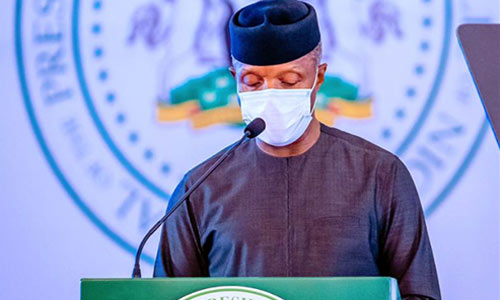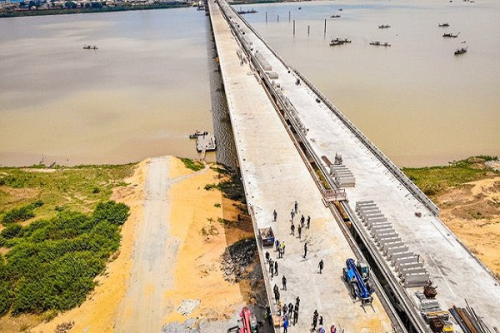THE EXECUTIVE 22/01/2022
At World Economic Forum, Osinbajo Warns Multilateral Finance Institutions against Defunding Oil, Gas Projects in Africa

Vice President Yemi Osinbajo yesterday warned multilateral finance institutions against defunding oil and gas projects in Africa, as the Western World continues its drive to phase out polluting fuels, saying such a step would have medium and long term consequences on African economies.
Osinbajo, who delivered a special address (virtually) at the ongoing World Economic Forum in Davos, Switzerland, added that drastic actions would ultimately impede the aim of phasing out fouling oils.
He declared: “We need to ramp up energy access in response to this situation, which is why the transition from fossil fuels to renewable energies must be just and fair. We are emphatic in our view that natural gas, which Africa has in abundance, must be accepted as a transition fuel.
“Although, we in Africa are working towards the globally accepted net-zero future, we are also conscious that our energy needs are increasing with the growth in our economies. We must not allow this worrying situation to be compounded further by global inaction, processes and rules that make it difficult for Africa to adapt to climate change or indeed to develop.”
Osinbajo also urged the international community to meet its pledge that was recently re-affirmed at COP-26, of providing $100 billion annually in climate finance to support climate change efforts in developing countries.
He likewise called for a waiver on the intellectual property rights, to allow African countries produce COVID-19 vaccines to contain the spread of the virus and improve protection for Nigerians and Africans.
The vice president lamented that less than 10 per cent of African countries had vaccinated 40 per cent of their population.
He also warned that there would be a relatively slow rollout of vaccinations in Africa due to resource constraints, adding, “Yet, vaccinations remain essential because of the mutation of the virus and the emergence of variants that may be more dangerous than the Omicron.”
Osinbajo continued: “There are also the issues around African countries being able to produce their own vaccines. And that is entirely possible with cooperation, especially around intellectual property issues. We have to look at issues around patent rights, intellectual property rights, and exclusivity rights; especially if we’re going to improve the chances of African countries to manufacture vaccines locally.
“We have to look at relaxing those rights. Patent waivers and intellectual property waivers will be important.
These are proved to be a problem now. No one seems to be making much progress in that respect. But we can’t really talk about African countries producing their own vaccines if we don’t address those important structural problems. I think that could very easily be done.”
Osinbajo stressed that despite giant strides recorded across Africa, “there are still challenges to overcome which requires international collaboration that can help to tackle climate change, address security concerns, promote economic prosperity, combat disease and improve governance.”
He listed some of the progress on the African continent, including the recovery from the global pandemic, economic growth by 3.7% last year and a projected 3.8% growth in 2022.
The vice president noted: “There is now in place an African Continental Free Trade Area agreement to fast-track economic transformation just as the continent is making giant strides in agriculture, manufacturing and digital technology.”
He added that in Nigeria for instance, 6 unicorns have emerged in the past six years.
Osinbajo said it was time for the international community to “walk the talk” by meeting its commitments towards advancing growth in developing economies, especially climate change obligations.
On the issue of peace and security, the vice president stressed that African countries face a serious threat of terrorism arising from the encroachment of global terror groups and their franchises into Africa.
According to him: “It is imperative for the international community to make more robust interventions to clear terrorists from Africa just as it did in the Middle East and other parts of the world. The United Nations Security Council must find unanimity in working with and assisting African countries to eradicate the menace of terrorism in the continent once and for all.”
Osinbajo also called on the international community to support African countries to overcome fiscal challenges arising from their limited revenues.
According to him, the creation of $650 billion in new Special Drawing Rights last year was a step in the right direction, “but more needs to be done to enable African and other developing countries access the SDRs that are not needed or being used by developed or emerging economies.”
He further urged multilateral organisations to consider the huge obligations placed on African countries and adopt debt relief initiatives such as the Debt Service Suspension Initiative and the Common Framework for Debt Treatments in a manner that would not further constrain the resumption of growth to the continent.
On governance, Osinbajo called on the international community to support the efforts of West African leaders, under the auspices of ECOWAS, particularly their condemnation of the incidences of coup d’états and unconstitutional changes in government in the region.
The vice president was one of the 12 guests that delivered Special Addresses at this year’s event during which no fewer than 25 Heads of State and Government featured generally at the virtual forum since Monday.
The 2022 virtual edition of the forum features a mix of visionary “state of the world” special addresses and ambitious high-level leadership panels focusing on critical collective challenges, among others.



